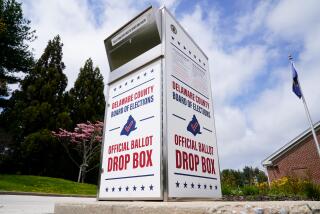U.S. Chamber of Commerce launches new campaign ads
- Share via
Reporting from Washington — Voters in seven congressional districts and the state of Washington will see new ads on the airwaves by the U.S. Chamber of Commerce, which is among a handful of conservative groups with plans to spend heavily in the final days of the midterm campaign.
Armed with millions of dollars but facing a shortage of airtime in many television markets, the Chamber will spend $1 million on radio and Internet advertising in support of Dino Rossi, the Republican candidate challenging incumbent Washington Sen. Patty Murray.
The group, which has already spent millions on ads opposing California Democratic Sen. Barbara Boxer, is also considering dumping more money into that race, a Chamber official said.
The Chamber also plans buys in the districts of seven incumbent Democratic House members: Raul Grijalva and Gabrielle Giffords of Arizona, Brian Baird of Washington, David Obey and Steve Kagen of Wisconsin, and John Boccieri and Zack Space of Ohio. Baird and Obey are retiring.
With the exception of some Blue Dog Democrats, the Chamber’s considerable advertising budget has gone largely toward helping Republicans. The new buys would bring the Chamber’s presence in campaigns this year to 50 House races and 12 Senate races.
Unlike a $50-million “House surge” announced earlier in the month by a set of conservative groups with the intent of thinning out Democrats’ resources, the new Chamber buys were seen as an attempt to infuse much-needed cash into races where the money would be especially helpful.
“It looks like the Chamber is moving into competitive races where the NRCC is not contributing significantly,” a Democratic strategist said.
Also planning to ramp up its spending is American Crossroads, a group formed in part by Republican strategist Karl Rove.
While known for its expensive ad buys, American Crossroads has also dedicated $10 million to an extensive ground game, which includes the crafting of lists -- using a combination of micro-targeting data and information shared from other conservative groups -- that workers will use to make contact with voters.
The group is on the ground in nine battleground states -- including Colorado and Nevada, where it will send more than 100 workers -- distributing mailers and making phone calls to voters.
kim.geiger@latimes.com tom.hamburger@latimes.com
More to Read
Get the L.A. Times Politics newsletter
Deeply reported insights into legislation, politics and policy from Sacramento, Washington and beyond. In your inbox twice per week.
You may occasionally receive promotional content from the Los Angeles Times.










